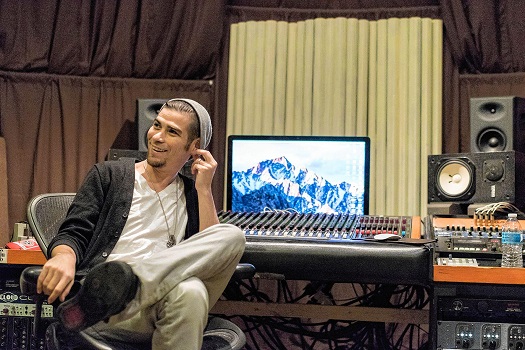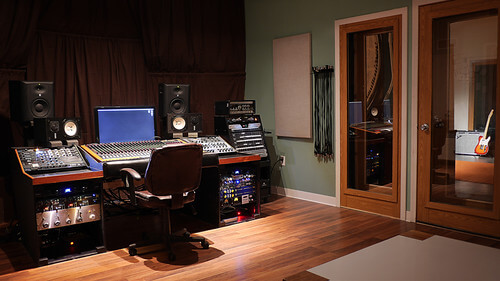
Recording Connection mentor Joey Gurwin
Recording Connection mentor, producer Joey Gurwin of
Oranjudio Recording Studios is known for his ability to capture the magic that’s found on old school records through his synthesis of today’s digital, new school technology and conventional analog recording techniques. From working with multiple Grammy winning artists and chart-toppers, to local, national and even international bands and artists, Joey’s all about making the music shine through.
So what kinds of projects do you do at Oranjudio Recording Studio?
“O.A.R. is a great Ohio band I’ve worked with. And the students tend to really like the A$AP Ferg thing and the Mac Miller stuff who are two pop/hip hop artists that we’ve worked with as well as Flo Rida.
My personal highlight is Seun Kuti, who’s Fela Kuti’s youngest son. We got to do a record with him and Fela’s band, Egypt 80, which was an amazing experience for me…I was honored to have Carlos Santana add a bunch of guitar tracks to that record. He just released it. It’s called ‘Black Times’ and it’s the title track of that record. It’s quite spectacular. Yeah, and we get a lot of really, really great artists here. I’m just as proud of the stuff that we do for local independent artists as we do for the O.A.R.s or the Seun Kuti’s. It’s just all really exciting.”
Do you record in analog or digital?
“Probably 9 times out of 10, I’m recording in digital, but that being said, I try to approach it in an analog fashion. I try to get the various tones as much as I can with using different mic techniques and different, preamps and microphone feels. A, because it feels more real to me, and B, because the client often wants to hear it sound good right away…They want it to sound like how they imagine it to sound.
I find that relying a bunch on digital postproduction tends to turn into a situation where it’s like, ‘Oh, well, we’ll fix that in the mix. We’ll fix that in post.’ And that’s not the best way to do things. So, I try not to digital, or have it too available as a crutch, because I also find that it gets the best performance from a performer.”
So in these hybrid sessions, you’re keeping the artist inspired because what they’re hearing in the playback is something that they like, right?
“Yeah, exactly, exactly. Digital has impacted everything, from the workflow to the ability to try things out without having to worry about the amount of tape you’re burning through.

Studio A Control Room, Oranjudio Recording Studios
Now we have terabytes and terabytes of data at our fingertips. And so we can record the amount that used to take rooms of tape to fill up. That’s a really positive thing, especially as far as people recording at home, for preproduction and stuff like that. Stuff that would have taken hours and hours and hours in the purely analog tape realm, I can do in minutes, with a mouse.
On the flip side of that coin is, sometimes, there’s just so many options! Sometimes we over-record, because we can, because data is so cheap. Back in the days of when we were using purely tape, you have to really, really know that you want to do another guitar take, because you’re erasing the last guitar take. As opposed to now, when I can just hit Command-Z and undo what you just did, or playlist it and comp up a take from 20 different takes.
The digital realm definitely allows for that flexibility, but it can also create almost like a mental roadblock with people, because you can do it so many times and you can overdo it. And, you know, perfect is often the enemy of really good. And specifically, with the editing process things like Melodyne, Auto-Tune, and Elastic Audio, and Beat Detective, all these things that are tools, can a lot of times create music that feels lifeless. I listen to old Stevie Wonder records or Miles Davis records and maybe there’s an error there, but there’s also a lot of feel and groove in that. So sometimes, you can edit the life out of a record really quickly in the digital realm.”
So what sparked your interest in audio in the first place?
“I’ve been into music for as long as I can remember. You know, sneaking out late at night and stealing my dad’s records and making quick tape dubs of them so I could listen to them on my Walkman…I guess it started there. And I would just take all my allowance money and spend it on tapes and CDs, and whatever else when I was a kid. And then I started getting into live music when I was probably 14 or 15. We’re a college town and there was a band of older kids, and I would help them in some college bar, loading their gear every Tuesday when I was in high school. Then I learned to play and became very obsessed with recording stuff and dubbing tapes. I’d go out, record shows when I could, with just a little two-microphone setup or skewing audio from the soundboard and trading tapes with my friends. That’s where the whole thing started.”
What do you want to see in the students you choose to take on as externs? What kinds of qualities should they have?
“The word is self-motivated. I’m not here to remind them to do their homework or assignments. They should be all about that on their own. They should be downright passionate about what they’re getting to do which is really soak up how music gets made in a professional environment. And if somebody is looking for a basic nine-to-five, where you can just show up and phone it in for eight hours, clock in and clock out, then you’re in the wrong industry.”
Learn more about
Recording Connection for audio engineering, music production, live sound, Ableton, beat making and more.
* * * * *



